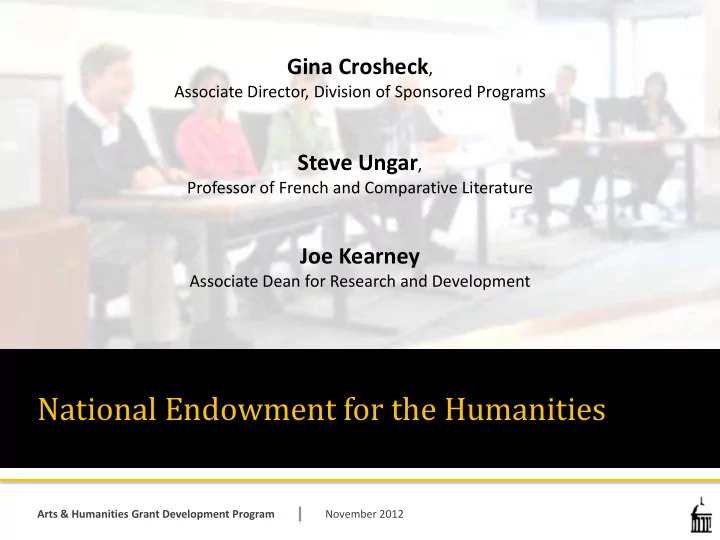

Gina Crosheck , Associate Director, Division of Sponsored Programs Steve Ungar , Professor of French and Comparative Literature Joe Kearney Associate Dean for Research and Development National Endowment for the Humanities Arts & Humanities Grant Development Program November 2012
NEH: An Overview Organization of NEH http://www.neh.gov/about/organization • Division of Public Programs • Division of Research • Division of Education • Office of Challenge Grants • Office of Digital Humanities • Division of Preservation and Access • Bridging Cultures State Humanities Councils apply to NEH every year for funding and for special project funding.
NEH Funding Strategy Begin with an application to attend a NEH funded Seminar, • Institute, or Workshop http://www.neh.gov/grants/apply-neh-funded-seminar-institute-or-workshop Helps you develop connections with NEH funded Directors – NEH really appreciates having one of its Seminar Directors be a reference for one of your other applications. Apply for Summer Stipend for Individual Work • Project Grants – if possible work with a senior colleague on a • successful Collaborative Research or other Major Division grant project Individual Fellowships are the most competitive of all – receive so • many applications, the Program Officers will not review them in advance.
NEH: Things to Know • NEH Program Officers may be the most helpful of all Sponsors – federal and private. • NEH Program Officers will critique draft proposals if you plan far enough in advance with the exception of the Individual Fellowship or Summer Stipend. • NEH grants take a great deal of time to put together; therefore always start early • NEH offers you successful sample applications on line to use when preparing yours • NEH has consistent deadlines and always posts their new guidelines on line at least two months in advance
NEH: Things to Know • NEH grants are electronic now and utilize Grants.gov for all submissions – the Individual Fellowships and Summer Stipends – submitted by individuals – all others submitted by the Division of Sponsored Programs – talk with Ann Knudson or Kristi Fitzpatrick for assistance. • NEH takes up to 9 months to make a decision on the application; therefore it’s critical for you to plan several years ahead for what programs makes the most sense for your research agenda and your stage of career • NEH allows you to resubmit. You can get reviewers comments if your proposal is unsuccessful but you must request them in writing.
Sponsored Programs Contacts for NEH Gina Crosheck, gina-crosheck@uiowa.edu Mary Blackwood, mary-blackwood@uiowa.edu http://dsp.research.uiowa.edu/dsp-staff-directory
Tips from the NEH Evaluation criteria Evaluators are asked to apply the following five criteria when judging the quality of applications: ① The intellectual significance of the proposed project, including its value to humanities scholars, general audiences, or both. ② The quality or promise of quality of the applicant’s work as an interpreter of the humanities. ③ The quality of the conception, definition, organization, and description of the project and the applicant’s clarity of expression. ④ The feasibility of the proposed plan of work, including, when appropriate, the soundness of the dissemination and access plans. ⑤ The likelihood that the applicant will complete the project. Source: NEH application writing workshop, 2011
Tips from the NEH Improve your chances of success (Only for some programs) Ask the staff to comment on a draft application. • Become a panelist or reviewer. • Read applications for your institution. • Panelists will only know you’re applying again if you tell them; bitter words • about a previous submission usually distract from your argument and take up space. Source: NEH application writing workshop, 2011
Tips from the NEH Common misconceptions about peer review The same panelist kills my application year after year. • Only elite schools are funded because panelists come from elite schools (old • boy’s network). Panelists don’t understand my field. • Panelists don’t appreciate my past work. • I don’t know anyone at NEH, so I will never get funded. • My application won’t get funded because NEH doesn’t fund cutting-edge • approaches or work in my field. I’m too junior to get funded. • It’s too early in my project. • Source: NEH application writing workshop, 2011
NEH Funding Rates Fellowships 2010: Received 1235 applications, funded 111 (9%) 2011: Received 1405 applications, funded 99 (7%) Summer Stipends 2010: Received 1014 and funded 85 (8%) 2011: Received 1000 – funding pending Awards to Faculty 2010: Received 156 Funded 10 (6%) Source: NEH application writing workshop, 2011
1 New grants, supplemental awards on previous years’ grants, transfers to other agencies, and program contracts. http://www.neh.gov/files/2011_neh_annual_report.pdf
Recommend
More recommend